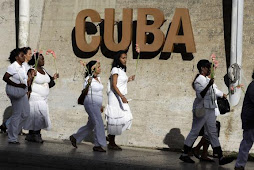Lawyer for Cuban agents vows last-ditch appeal
By PAUL HAVEN
Associated Press
HAVANA -- A lawyer for five Cuban agents sentenced to long jail terms
for spying in the United States said Wednesday he is preparing a
last-ditch appeal, arguing that one of the men received bad counsel and
that the jury for all five was prejudiced because the U.S. paid several
journalists who covered the trial.
Thomas Goldstein said he would submit the appeal on Feb. 15 before U.S.
District Judge Joan Lenard, who can either rule on the matter, ask to
hear arguments or order a full evidentiary hearing. Four of the men have
been jailed since 1998. The fifth, Rene Gonzalez, was released last year
after 13 years in jail, but has been ordered to remain in the United
States while he serves out his probation.
Gonzalez's lawyer, Phil Horowitz, said he would also appeal that
probation decision shortly. He said the 55-year-old dual Cuban-American
citizen is working as a caretaker at a private home, but would not
reveal the location out of concern for his client's security.
The lawyers were interviewed by The Associated Press in a restricted
area of Havana limited to government activities and hosting visiting
foreign dignitaries.
While the agents' case is largely forgotten in the United States, it
remains a cause celebre in Cuba, where the government hails the "Cuban
Five" as heroes who were only trying to detect and prevent violent
attacks against their country by exile groups. Cuban state-run media
publish near daily accounts of solidarity from around the world, and
images of the men stare down from billboards along rutted country roads.
Goldstein said he will argue that inadequate counsel from his lawyer
resulted in a murder conviction and life sentence for one of the agents,
Gerardo Hernandez, and he said all of their cases were prejudiced by a
U.S. government program that was paying thousands of dollars to key
journalists while the high-profile trial was going on, a fact that only
came out later.
The journalists were paid for appearances on U.S. government radio and
TV broadcasts beamed to Cuba, and they also continued to produce stories
for independent media outlets.
Advocates for the five also say the trial court was wrong to reject
their request for a change of venue from South Florida, which is home to
a large Cuban exile community.
"I don't think anyone can deny that it is a serious issue when you try
supposed Cuban agents in a Miami court ... and that it obviously is
going to be a very political, very fraught trial," Goldstein said. "On
top of that, to learn that the media is being paid by the U.S.
government, we think raises a serious issue."
Goldstein, a Washington-based Supreme Court litigator, said he would
take the case all the way to America's highest court if necessary, and
that if the appeal fails, it will mean "the end of the road" for the
legal process in the case. After that, he said, the only hope would be a
political solution.
That is the same situation facing Maryland native Alan Gross, who was
arrested in 2009 and sentenced to 15 years in jail after being caught
bringing satellite phones and other equipment into Cuba illegally while
on a USAID-funded democracy program. His appeal to Cuba's top court was
denied last year, so Gross's only chance at release rests on a
humanitarian pardon by Cuban President Raul Castro or some form of
prisoner exchange.
Cuba has stopped short of linking the cases, but senior officials have
said no one should expect the island to free the 62-year-old American in
a "unilateral gesture."
Goldstein rejected any attempt to compare the cases legally, but that
the symmetry of the two cases presented a political opportunity. He
stressed, however, that he was a private lawyer and not privy to the
thinking of the Cuban government on Gross.
"Alan Gross is entitled absolutely to individual justice," he said. "I
would never encourage anyone to link what happens to him to what happens
to my clients. You can't hold someone literally hostage," he said. "But
it strikes me that to the extent that there are political solutions to
both sets of cases, then there could end up being linkage ... on the
political front."
Goldstein said the politically charged atmosphere in the lead-up to the
U.S. election in November complicated any efforts to find common ground,
particularly given the importance of Florida in presidential politics
and strong feelings about the agents' case among many Cuban-Americans.
But he said he hoped President Barack Obama would ultimately see that
freeing the men was good politics, and something that would likely lead
to reciprocal gestures from Havana.
"If the president of the United States were to release the Five and
nothing else happens, then it kind of falls like a dud," he said. "If,
on the other hand, Cuba releases Alan Gross, the president releases the
Five, the Cuban government, whatever ... it would allow the Cuban
government to do a number of things."
Follow Paul Haven at http://www.twitter.com/paulhaven/
http://www.miamiherald.com/2012/02/08/2631033/lawyers-for-cuban-agents-vow-last.html





No comments:
Post a Comment